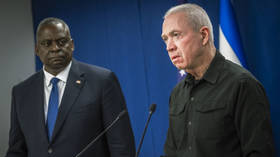Pentagon ‘furious’ with Israel over Nasrallah strike – media

US Defense Secretary Lloyd Austin was “furious” with Israeli Defense Minister Yoav Gallant when he learned at the last moment that Israel was about to assassinate Hezbollah leader Hassan Nasrallah, the Jerusalem Post has reported.
Nasrallah was killed in a massive Israeli airstrike on his underground compound in Beirut on Friday. The Israel Defense Forces (IDF) claimed that 20 senior Hezbollah officers were killed alongside Nasrallah, while the number of civilian casualties remains unclear.
The US immediately denied any role in the strike. President Joe Biden said that he had “no knowledge” that Israel was planning the attack, while Austin told reporters that he had “no advance warning,” and only spoke to Gallant “while the operation was actually already underway.”
Citing anonymous sources, the Jerusalem Post claimed on Sunday that Austin was “furious” at the lack of notice he was given by Gallant. Austin and Gallant have spoken by phone more than 125 times since the start of the Israel-Hamas war last year, the newspaper stated, adding that the US defense chief “essentially lost it with Gallant over the Nasrallah killing and the short notice provided.”
“Nasrallah was a bad guy, but it is frustrating that the Israelis are doing this without consulting us and then ask that we clean up when it comes to deterring Iran,” an anonymous US official told the news site Axios on Saturday. According to Axios’ sources, Gallant asked Austin to issue public statements to deter Iran from launching a retaliatory attack against Israel following Nasrallah’s death.
Whatever Austin told Gallant in private, he dutifully complied with this request. In a readout of another phone call with Gallant on Saturday, the Pentagon said that Austin “stressed that the United States is determined to prevent Iran and Iranian-backed partners and proxies from exploiting the situation or expanding the conflict.”
“The Secretary made it clear that the United States remains postured to protect US forces and facilities in the region and committed to the defense of Israel,” the readout continued.
Nasrallah was killed just hours after Israeli Prime Minister Benjamin Netanyahu rejected an American- and French-authored ceasefire proposal, which called on Israel to halt its attacks on Lebanon for 21 days to allow for talks between West Jerusalem and Hezbollah. According to American and other Western officials, Netanyahu had agreed to the proposal several days earlier, before abruptly backtracking and vowing to keep striking Lebanon “with full force.”
Less than a week before Nasrallah’s death, thousands of pagers and walkie-talkies used by Hezbollah operatives simultaneously exploded across Lebanon, killing at least 37 people and injuring more than 3,000, many of them women and children. The sabotage operation is widely believed to have been the work of Israel’s Mossad intelligence agency, but as with the airstrike that killed Nasrallah, the US claimed that it had no prior knowledge of, or involvement in, the plan.














